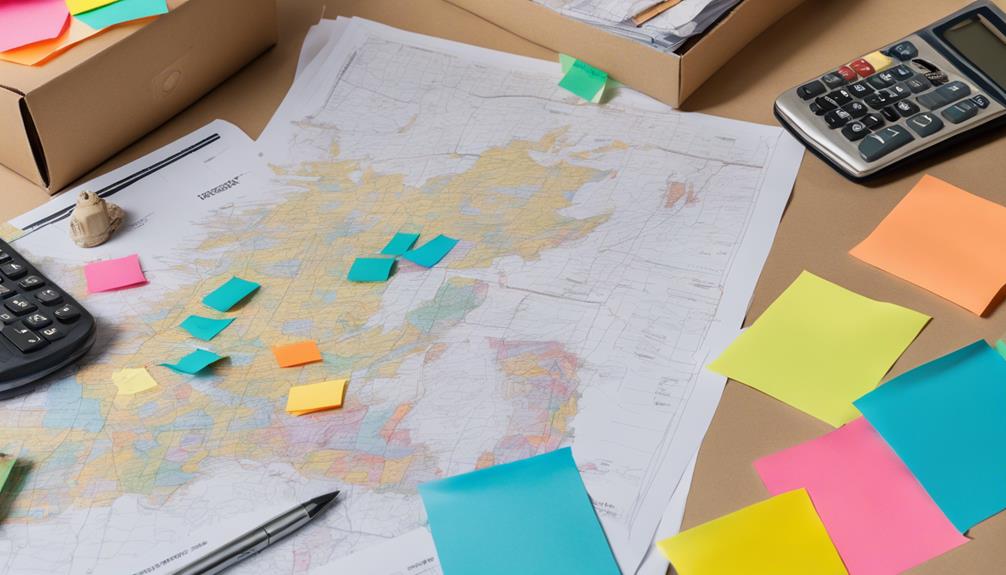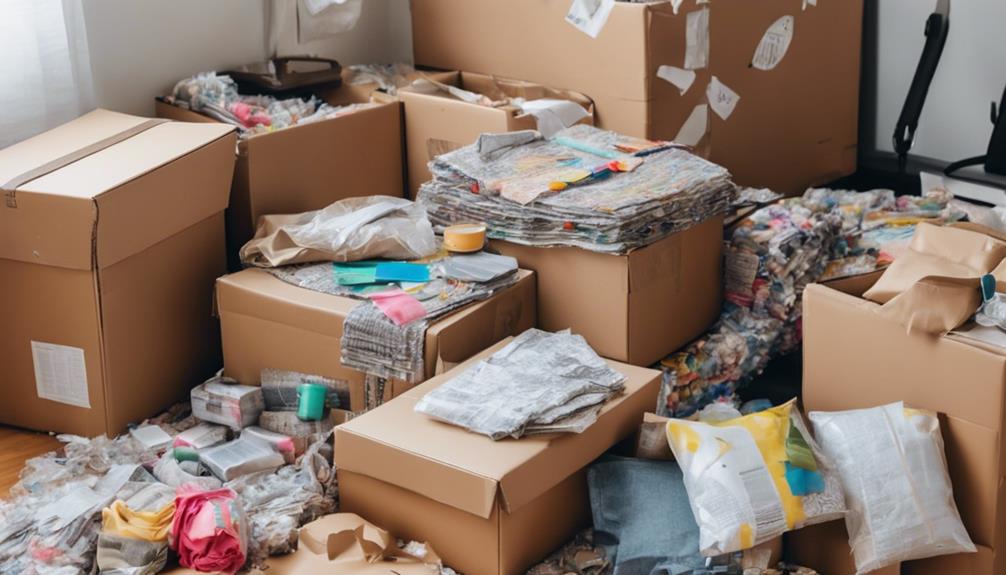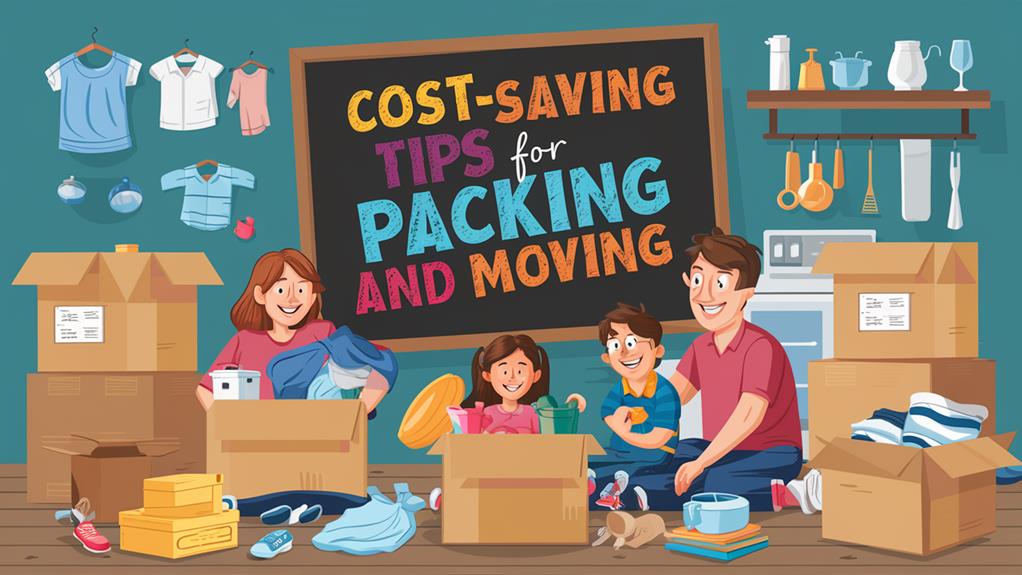Packing and moving can be affordable if you use effective strategies. Start by decluttering your belongings; this saves on truck rental costs. Look for free packing supplies from local businesses or ask friends for boxes. Consider DIY moving to cut labor costs, and enlist friends or family to help. Remember to create a budget that includes hidden costs, like cleaning services and insurance. Scheduling your move during off-peak times, like mid-week, can also lower rates. By planning ahead and staying organized, you'll make your move smoother and more cost-effective, and there's more helpful advice just ahead.
Understanding Moving Costs

Understanding moving costs can help you budget effectively and avoid surprises. When you're planning a move, knowing the average costs is essential. For local moves, you might spend around $1,700, while out-of-state moves can easily exceed $7,000, depending on the distance and volume of your belongings.
Additionally, be aware of common hidden fees, like packing supplies, which can add significantly to your overall expenses.
Understanding moving costs involves considering not just the basic fees from moving companies but also hidden costs. These can include insurance for your items during transit, cleaning services for your old home, and potential storage fees.
It's important to account for these additional expenses to avoid going over budget.
If you're considering a DIY move, you might save some money, but remember, you'll still need to factor in costs for packing materials and the time required to pack and unpack.
Many people underestimate their overall moving costs by about $723, so thorough budgeting is crucial.
Additionally, if you hire professional help, tipping movers is customary, so plan for 15-20% of the total bill.
Benefits of Professional Movers
When it comes to moving, hiring professional movers can make a world of difference. These experts can significantly reduce the time and effort involved in your move. They're trained to efficiently load and transport items, often completing the job in a fraction of the time it would take you if you chose a DIY approach. This efficiency not only saves you time but can also help you save money.
Additionally, professional movers often provide comprehensive services that cater to your specific needs, such as packing and unpacking, which further streamlines the moving process.
Using a professional moving service means you don't have to worry about hidden costs, like renting trucks or buying packing supplies. Many moving companies provide high-quality packing materials that keep your belongings secure. Plus, they often offer insurance options, giving you peace of mind that your items are protected against damage or loss during transit.
Another benefit is the reduced risk of injury from heavy lifting. Professional movers are experienced in handling large, cumbersome items safely. By hiring them, you can reduce your overall stress and ensure a smoother moving experience, allowing you to focus on settling into your new home rather than worrying about the logistics of your move.
Effective Cost-Saving Strategies

Before you start packing, it's smart to declutter your belongings.
By recycling and donating items, you can lighten your load and cut down on moving costs.
Plus, using free packing supplies like boxes from local stores and repurposing household items can save you even more money.
Declutter Before Moving
Decluttering your home can feel like a breath of fresh air, especially as you prepare for a move. By decluttering, you not only lighten your load but also save on moving costs. Reducing the volume of items may lower truck rental fees and even labor costs by up to 10-15%.
Consider organizing a garage sale to generate some extra cash while decreasing the number of items you need to pack. Selling bulky or non-essential items online is another great way to offset moving costs.
Plus, don't forget about the benefits of donating unwanted items. Not only does it ease the packing process, but it can also provide potential tax deductions, which makes it financially beneficial.
When you streamline your possessions, you promote a fresh start in your new living space. This helps enhance your overall moving experience while reducing post-move clutter.
Utilize Free Supplies
After lightening your load through decluttering, it's time to tackle packing without breaking the bank. One of the best ways to save money is by utilizing free boxes. Local businesses, community groups, and recycling centers often have extra boxes they're willing to give away.
You can also search online platforms like Facebook Marketplace or freecycle groups to find packing supplies at no cost.
Don't forget about your household items! Towels, blankets, and clothing can serve as excellent cushioning materials, so you don't need to buy bubble wrap. This not only saves you money but also helps protect your belongings during the move.
Check with friends and neighbors who've recently moved; they might've leftover packing materials you can use.
Participating in local online forums or groups dedicated to moving supplies can connect you with people giving away boxes and other packing essentials.
Affordable Packing Supplies
Packing doesn't have to break the bank, and finding affordable packing supplies is easier than you might think. First, consider utilizing free or cheap packing materials from local businesses, community groups, or online platforms like Facebook Marketplace and Nextdoor. You can significantly cut costs by repurposing household items, such as towels and blankets, as cushioning instead of buying bubble wrap or packing paper.
Collecting boxes is another great way to save money. Ask friends and family for their used moving boxes or check with local retailers, many of whom are willing to give away boxes for free or at a low cost.
Starting this process early will help you avoid last-minute purchases that can lead to overspending. For added savings, consider purchasing packing tape in bulk. Buying in larger quantities often provides more affordable options, ensuring you have enough tape to secure all your boxes properly.
DIY Moving Considerations

Choosing to handle your own move can lead to significant savings, especially when you consider the high costs associated with hiring professional movers. A typical moving company can charge up to $200 per hour, so it's essential to weigh the convenience against potential savings.
One of the best DIY moving tips is to enlist the help of friends and family. Their support can drastically reduce labor costs and make the process more enjoyable.
When it comes to transportation, consider renting a moving truck. This option gives you greater control over your schedule and is often more cost-effective than full-service movers. If possible, use borrowed trucks or trailers from friends to eliminate rental fees completely. This way, you can save even more money.
Additionally, packing your own items can help you avoid professional packing service fees, which can add 10-15% to your moving costs. By focusing on fewer items and packing strategically, you can further reduce expenses.
Planning Your Move Efficiently
When you start planning your move, it's important to create a timeline for your tasks and stick to it.
Setting a budget for moving costs will help you avoid unexpected expenses, while organizing your packing supplies efficiently can save you time and money.
Timeline for Moving Tasks
A well-organized timeline for moving tasks can make your relocation process much smoother and less stressful. Start planning your move at least two to three months in advance. This gives you ample time to organize, pack, and secure the best moving services.
Create a detailed moving checklist that outlines tasks to be completed weekly. Prioritize essential activities, like canceling utilities and sourcing packing supplies.
Declutter your belongings at least a month before moving. This reduces costs associated with transporting unnecessary items and simplifies packing.
Schedule your move during off-peak times, like mid-week or mid-month, to take advantage of lower rates from moving companies. Aim to complete packing non-essential items two weeks before your move date. This way, you'll only need to pack daily-use items in the final days, ensuring a smoother transition to your new home.
Budgeting for Moving Costs
Budgeting for moving costs is crucial to ensuring a smooth transition to your new home without financial strain. Start by determining the distance of your move, as local moves typically average around $1,700, while out-of-state relocations can exceed $7,000.
Identifying essential moving expenses, like cleaning services, moving insurance, truck rentals, packing supplies, and potential storage rentals, is vital, as these can significantly impact your overall budget.
Many individuals tend to under-budget for moving costs, with an average shortfall of about $723. To avoid this, it's wise to obtain estimates from multiple moving companies, allowing you to compare rates and services. This way, you can hire professional movers that align with your budget and avoid unexpected expenses.
Planning ahead is also key; shopping for supplies early can lead to better deals, ultimately reducing your overall moving expenses.
Organizing Packing Supplies Efficiently
Efficiently organizing your packing supplies can make all the difference in a smooth moving experience. Start collecting boxes and other packing supplies several months before your move. This way, you can avoid last-minute purchases, potentially saving you up to $723.
Look for free resources to gather packing materials, such as sourcing boxes from local businesses or recycling centers. This not only helps you save money but also contributes to recycling efforts.
When organizing, categorize your supplies into essential items like boxes, tape, and bubble wrap. Label each box with its contents for easy access during unpacking. To protect fragile items, consider repurposing household items like towels or blankets. They can serve as excellent padding and packing material, reducing your need for traditional supplies.
Lastly, create a detailed checklist of all needed supplies. This ensures you have everything prepared in advance, streamlining the packing process and avoiding unnecessary purchases on moving day.
With these strategies, you'll effectively manage your packing supplies, making your move more organized and budget-friendly.
Hidden Costs to Watch For

Moving can feel like a whirlwind, but hidden costs can quickly turn that excitement into stress. When you're planning your move, it's crucial to keep an eye out for additional fees that mightn't be included in the initial quote from your moving company. These can include charges for fuel, mileage, and insurance, which can add up unexpectedly.
If your move doesn't align perfectly with your new place's availability, you might incur storage fees for holding your belongings, which can further stretch your moving budget.
Don't forget about cleaning services for your old residence; these might be necessary to get your security deposit back, but they can add to your overall costs.
Also, if you're moving special items like pianos or large appliances, be sure to disclose these to avoid surprise charges.
Finally, last-minute changes can lead to even more additional fees, including costs for utility setups and storage.
Conclusion
In conclusion, moving doesn't have to break the bank. By understanding your costs, considering professional movers, and using effective packing strategies, you can save money and reduce stress. Don't forget to find affordable packing supplies and plan your move carefully to avoid hidden fees. With a little preparation and smart choices, you can make your moving experience both budget-friendly and efficient. Remember, every bit you save adds up, making your new home feel even better.
